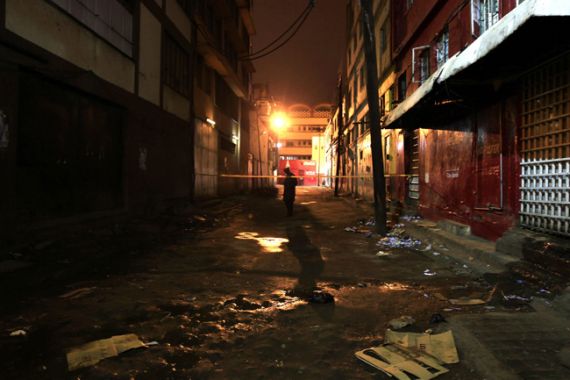Kenyan capital hit by second blast
Twin attacks in central Nairobi come two days after the US issued a terrorism alert in the Kenyan capital.

An explosion has hit a crowded bus stop in central Nairobi, killing at least one person and wounding eight.
The Monday evening blast was the second of the day in Kenya’s capital, twin assaults that came two days after the US warned of possible terrorism attacks.
The US warning came after the Somali group al-Shabab said it would carry out reprisal attacks after Kenyan troops entered Somalia earlier this month.
Mathew Iteere, the police commissioner, told a news conference earlier on Monday that the authorities could not yet name suspects from the first blast.
“It is too early at this point in time to give a conclusive answer,” he said.
Unsubstantiated claims
Peter Greste, Al Jazeera’s correspondent in Nairobi, said the first incident did not fit the pattern of previous al-Shabab attacks, which typically involved high-profile targets and were usually followed by claims of responsibility.
“What the police are saying is ‘we simply have a coincidence of the warning from al-Shabab that they would attack Kenya, and then we have the grenade attack from last night’,” he said.
“There is absolutely no physical evidence whatsoever, and it could be any one of a number of people. This could be criminal, such as business rivals looking to damage a competitor, or it could be al-Shabab sympathisers,” he said.
The warning issued by the US on Saturday said likely targets include shopping centres and night clubs where foreigners congregate.
The attacks on Monday occurred at a downtrodden bar and at a blue-collar bus stop just outside the central business district.
The wounded were taken to Nairobi’s national Kenyatta Hospital. A doctor told the Reuters news agency that some were seriously injured but most had light head injuries. Bernard Momanyi, a journalist in Nairobi, told Al Jazeera that all of those wounded were Kenyan nationals.
The weapon used in the early Monday attack was a Russian-made F1 grenade, police said. A similar type of grenade was used in a downtown Nairobi attack in December 2010 at a bus station.
After the second blast, police cordoned off the area but did not provide any immediate comment, though the AP news agency reported that security has now been tightened around hotels, bridges and fuel depots.
Opposition to intervention
Meanwhile, Sharif Sheikh Ahmed, the Somali president, said on Monday that he opposed Kenya’s week-old military assault against al-Shabab in the south of the country.
While al-Shabab had already threatened revenge attacks, the public opposition of the Somali president has further raised the stakes over the controversial cross-border incursion.
“Somalia’s government and its people will not allow forces entering its soil without prior agreement,” Sharif told reporters in Mogadishu.
“There is only one thing we know about the Kenyan forces, and that is their offer of training to the national army of Somalia.”
Kenya’s military incursion, launched eight days ago after several foreigners were abducted on its soil and taken across the border, stunned the region.
Its troops and tanks have pushed about 100km into southern Somalia, areas controlled by the al-Qaeda-linked al-Shabab.
Sharif’s statement appeared to contradict an agreement signed last week by Kenya and Somalia’s defence ministers to “co-operate in undertaking security and military operations”.
The agreement, inked in Mogadishu, limits Kenyan operations to Somalia’s Lower Juba region.
Sharif’s weak Western-backed government survives in Mogadishu under the protection of more than 9,000 African Union troops, who have spent four years battling al-Shabab’s military drive to topple his administration.
His government controls only the war-ravaged capital, while the African Union Mission for Somalia (AMISOM), with troops from Uganda and Burundi, continues to fight bloody battles on Mogadishu’s outskirts.
“AMISOM is in Somalia with an AU mandate and the consent of Somalia’s government,” Sharif said.
“There is collaboration with Kenya which is to assist Somalia’s national army, so that our forces can fulfill their duties.”
Sharif’s comments perhaps echo worries of some Somalis who oppose al-Shabab, but who have expressed concern that Kenya’s attack on the rebels may also include an attempt to carve out a buffer zone of control in the south.
Kenya sent troops into Somalia following the abductions of a British tourist, a disabled French woman who has since died in captivity and two Spanish aid workers.
Al-Shabab denies kidnapping the foreigners.